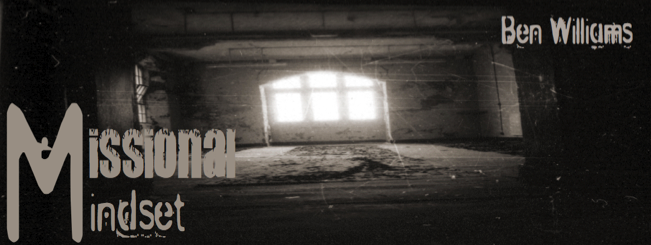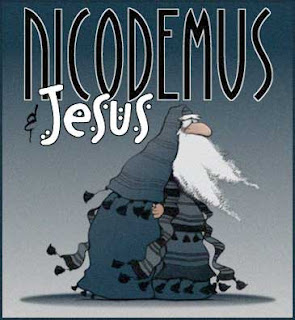 In America, the church does a lot of griping about the condition of the American culture. Whether it is from the pulpit or a layman’s opinion, the church is always vehemently talking about the increasing corruption that is plaguing our nation.
In America, the church does a lot of griping about the condition of the American culture. Whether it is from the pulpit or a layman’s opinion, the church is always vehemently talking about the increasing corruption that is plaguing our nation.People are always very upset with certain television stations for allowing such grotesque content to be programmed or they are discouraged by who or who doesn’t get elected into office. They can’t believe what kinds of music are becoming popular or how Hollywood gets away with making such trashy films under the PG-13 rating. The church is always disgruntled at how the public school systems are seemingly going to hell in hand-basket cause prayer is ceasing and the Ten Commandments are forbidden and tolerance for everything but Jesus is being taught under the so-called “fact” that we evolved from monkeys from a big bang that makes as much sense as a fully functional automobile being formed by a tornado sweeping through a junkyard. So then the question must be asked…
How is the church supposed to make/change culture when the Gospel is so counter-cultural?
Answer…
Getting as far upstream as you can.
Culture or “Cultura” is the cultivation of the soil, mind, and spirit including our values, beliefs, customs and arts. It encompasses the stories we tell, the behaviors we have and the people/things we treasure.
Biblical History of Culture and the Gospel
Before Jesus ascends into heaven, He tells the disciples that they will go into very different cultures and different cities/countries to spread the Gospel, but notice the methods of how the message spread in the early church periods.
For example, Paul was sent as a Missional minister to different major cities almost completely ignoring the outskirts and rural areas. Think of his Missional territory for a moment: Rome, Corinth, Philippi, Ephesus, Thessalonica, Galatia, etc.
Back then it was more common for churches to meet in larger urban areas and for the pagans to surround the city in the more rural, farming areas. Nowadays we have seen a complete shift in which more churches are in rural areas than in the city. This is true for a few reasons:
1) Safety has become a problem in major urban areas dealing with increased crime rates;
2) Christians believe they keep their innocence and purity by moving away from progressive culture and sin; and
3) Churches fail to contextualize the Gospel and change methods to reach more people for the Gospel resulting in creating a sub-culture that is satisfied with keeping things the way they have always been.
What the church has somewhat failed to see is that when Christians run away from culture and cities, it gets worse. In essence, the church has added to the problem instead of being a part of the solution, which is advancing the Kingdom of God.
Culture As A River
Jesus calls us the light of the world, and He then says that we are a city on a hill that cannot be hidden (Matt. 5:14)
Now imagine with me that there is a river flowing down from that “city on a hill” and that river represents culture, as we know it.
If Christians move off of that hill and away from the city and away from major cultural spots, they are all of the sudden downstream of the river of culture.
They are now getting closer to the end of the filter of culture instead of being where culture is created. We must understand that TV, Radio, Movies, Books, Fashion, Attorneys and Judges that pass laws, Politicians, Money, and ultimately all beliefs and values come from upstream in the city and filter downstream to the outskirts and rural areas. And we can’t fool ourselves into thinking that our rural influence will ever flow upstream. It doesn’t happen like that. Nothing from the bottom of the river flows back up to the top. What happens on the farm does not catch fire in the city. Culture flows from city to suburbs to rural areas.
So….
We ought not be shocked when corruption increases on our tv sets, on the radio, in politics, in our judicial systems, and in our schools if we are not there having any influence or impact on where culture is made. We are only getting what is being filtered from the city upstream. That explains why Christians downstream get sick because the river is so polluted and filled with junk and garbage. They are then stuck trying to filter out the garbage for their families’ sake, but the longer they remain downstream, the more contaminated the river becomes.
(Before I lose your attention, I want to take a second to say that it is not a sin to be a church in a rural area. People need Jesus there too. In fact, God desires that rural churches exist especially as a result of church plants overflowing from the city.)
BUT if we want so badly the culture to change for the glory of God, we must infiltrate where culture is made, not where culture is filtered.
How can we make culture for the glory of God?
Take the Gospel as far upstream as possible so that others have the Living Water of Christ flowing down from the river of culture.
In our recent past as the church, we have thought that mass evangelistic events in more suburban churches are the solution for culture change. While there is nothing wrong with mass evangelism because it has been used by the Lord to change many hearts, it is not the solution for changing culture into a Kingdom culture. Why? Because changing culture isn’t about the number of people converted, but about the amount of converted people engaging in changing culture upstream.
In an interesting Sociological Study, a man named James Davidson Hunter (professor of Sociology at University of Virginia) did a study of major city and culture, and how culture has progressed throughout history. In his study, he described how on the electoral map (blue/red), those in major cities voted liberal and those outside the city voted more conservative. When the liberal team wins, those people in the rural areas become disgruntled and/or paranoid of the future of the country. He then came to the conclusion that it is not the amount of people that believe something, but where they live in the cultural stream.
To make more of a point, less than fifteen years ago, the American Psychiatric Association claimed that homosexuality was a disorder. It is now a celebrated alternative lifestyle even though if we polled the entire U.S., the majority of people would still say they don’t approve of it.
So how did this happen then?
It wasn’t because the majority of people got together and said this is how we want it.
It is because people in the cities with culture changing abilities and vision approve of it.
Oh, the power of a few!
Additionally, about 23 billion people have lived on the earth between 650BC – 1900 AD. The number of those who have assisted in creating culture as we know it is as few as 150 and no more than 3,000! WOW.
So here’s the deal.
Evangelism is needed, and people do need Jesus in rural areas, but for the Gospel to change culture and take full effect as the Great Commission, some need to be diligent in getting as far upstream as possible.
The content for this blog is attributed in great detail to Mark Driscoll’s sermon at the 20/20 conference in Raleigh, NC in Feb. of 2009 and for more info check out his books entitled Vintage Church and The Radical Reformission



